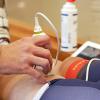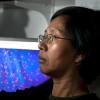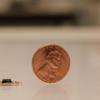News Headlines
 University of Colorado Boulder researchers have discovered that a protein-coding gene called Schlafen11 (SLFN11) may induce a broad-spectrum cellular response against infection by viruses including HIV-1.
University of Colorado Boulder researchers have discovered that a protein-coding gene called Schlafen11 (SLFN11) may induce a broad-spectrum cellular response against infection by viruses including HIV-1. One of the top CEOs in the Republic of Indonesia has pledged nearly $6 million in a philanthropic investment to support the Leeds School of Business’s efforts in entrepreneurship at CU Boulder.
One of the top CEOs in the Republic of Indonesia has pledged nearly $6 million in a philanthropic investment to support the Leeds School of Business’s efforts in entrepreneurship at CU Boulder. Amazon Web Services. Google. IBM. Microsoft. These are just a few of the major tech movers and shakers partnering with researchers and Big Data providers to invest in cloud computing.
Amazon Web Services. Google. IBM. Microsoft. These are just a few of the major tech movers and shakers partnering with researchers and Big Data providers to invest in cloud computing.
 Thanks to a new ultrasound technology developed by CU researchers and used by CU Boulder football, track and field, and basketball players, athletes can now painlessly measure their muscle glycogen levels in real-time in 15 seconds.
Thanks to a new ultrasound technology developed by CU researchers and used by CU Boulder football, track and field, and basketball players, athletes can now painlessly measure their muscle glycogen levels in real-time in 15 seconds. A team led by CU Boulder has found the mechanism behind the sudden onset of a “natural thermostat” in Earth’s upper atmosphere that dramatically cools the air after it has been heated by violent solar activity.
A team led by CU Boulder has found the mechanism behind the sudden onset of a “natural thermostat” in Earth’s upper atmosphere that dramatically cools the air after it has been heated by violent solar activity. This past summer, Silicon Flatirons launched the Governmental Entrepreneurial Leadership Accelerator (GELA) with City of Denver—the first accelerator of its kind, focused on encouraging entrepreneurial thinking and problem-solving in governments.
This past summer, Silicon Flatirons launched the Governmental Entrepreneurial Leadership Accelerator (GELA) with City of Denver—the first accelerator of its kind, focused on encouraging entrepreneurial thinking and problem-solving in governments. Innovation is part of our DNA. It makes CU Boulder a special place to live, work, create and collaborate. Our campus is filled with creative staff, faculty and students who are having a positive impact on our world, from 60 seasons of the Shakespeare Festival to missions to Mars.
Innovation is part of our DNA. It makes CU Boulder a special place to live, work, create and collaborate. Our campus is filled with creative staff, faculty and students who are having a positive impact on our world, from 60 seasons of the Shakespeare Festival to missions to Mars. Professor Tin Tin Su’s research, conducted with help of undergraduate students, resulted in startup company SuviCa. The company and CU Boulder recently received a patent for a promising chemical, SVC112, which helps prevent regrowth of cancer cells following radiation exposure.
Professor Tin Tin Su’s research, conducted with help of undergraduate students, resulted in startup company SuviCa. The company and CU Boulder recently received a patent for a promising chemical, SVC112, which helps prevent regrowth of cancer cells following radiation exposure. With a renewed focus on the CU Boulder campus and new initiatives aimed at streamlining the path from science to commercialization, the Technology Transfer Office is on pace for a record year and poised to provide even greater support for faculty.
With a renewed focus on the CU Boulder campus and new initiatives aimed at streamlining the path from science to commercialization, the Technology Transfer Office is on pace for a record year and poised to provide even greater support for faculty. Researchers from the University of Colorado Boulder and Northwestern University have developed a tiny, soft and wearable acoustic sensor that measures vibrations in the human body, allowing them to monitor human heart health and recognize spoken words.
Researchers from the University of Colorado Boulder and Northwestern University have developed a tiny, soft and wearable acoustic sensor that measures vibrations in the human body, allowing them to monitor human heart health and recognize spoken words.

